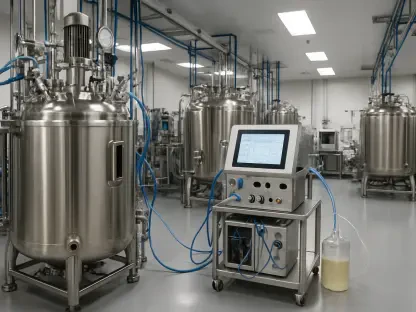The recent Senate Finance Committee hearing for Jamieson Greer, the nominee for U.S. Trade Representative (USTR) under President Trump, foregrounded Greer’s vision for America’s trade policy. Expertly balancing the nuances of trade strategies and economic protectionism, Greer aims to fortify the policies initiated during Trump’s first term, notably maintained and expanded under President Biden, such as tariffs on vital sectors including vehicles, steel, and semiconductors. His stance reflects a broader dialogue on international trade dynamics and underpins the aspirational goal of reestablishing the United States as a powerhouse of production and employment.
Addressing the Impact of Dumped Products and Trade Imbalances
The Negative Consequences of Dumped Chinese Goods
A significant emphasis of Greer’s testimony was on the adverse effects of dumped Chinese products on American industries. He delved into the repercussions for U.S. manufacturing, linking the influx of these discounted goods to a tangible decline in domestic employment. Greer pinpointed this issue as a critical challenge, reshaping perceptions of international trade’s role in America’s economic landscape. The representative’s remarks drew a close connection between China’s Permanent Normal Trade Relations (PNTR) status and the erosion of U.S. industrial jobs, arguing that this agreement has left American workers at a disadvantage.
During his presentation, Greer did not hold back from highlighting the decade-spanning impact of these policies, particularly focusing on the ways they have undermined the principles of fair competition. He argued for an urgent reassessment of PNTR status with China, proposing that such a review could be pivotal in restoring balance and equity to U.S. trade relations. By calling attention to these long-standing issues, Greer articulated a vision where American industries could regain their competitive edge through strategic policy adjustments and vigilant regulatory measures.
Reaffirming the Importance of Section 232 Tariffs
Furthermore, Greer passionately advocated for the continuation of Section 232 steel and aluminum tariffs, emphasizing their role in shielding essential American industries from global overcapacity. This policy, he argued, is not merely a protectionist measure but a necessary shield that preserves domestic capabilities in critical sectors. He highlighted the interconnectedness of these industries with broader economic health, stressing that their protection directly translates to the sustenance of high-quality, well-paying jobs within the United States.
By securing these sectors, Greer believes that America can stabilize its industrial base and ensure long-term economic resilience. His defense of Section 232 tariffs drew attention to the systemic risks posed by unchecked global production surpluses, which can distort market dynamics and disadvantage domestic producers. Greer maintains that these tariffs are a vital tool in the arsenal of American trade policy, positioning the country to better weather the complexities of the global economic landscape.
Looking Ahead: USMCA Review and De Minimis Rules
Reviewing the USMCA for Future Trade Stability
Looking forward to the 2026 review of the USMCA trade deal, Greer underscored the necessity of meticulous examination and potential revision to fortify rules of origin for automobiles and aerospace products. His testimony highlighted the importance of these rules in preserving and enhancing America’s industrial capabilities, ensuring that domestic production remains competitive against international counterparts. Greer’s approach reflects a cautious optimism, advocating for policies that not only secure current industrial strength but also pave the way for future advancements.
In addition to rules of origin, Greer placed significant emphasis on labor rights within the USMCA framework. He pointed out that safeguarding labor standards is crucial for maintaining the integrity of American production and supporting the workforce. By emphasizing these elements, Greer aims to create a more level playing field within the North American trade landscape, fostering conditions that benefit both industries and workers. His approach suggests a comprehensive strategy that aligns economic objectives with social and labor considerations.
Curbing Abuses Related to De Minimis Rules
Addressing the de minimis rules, Greer articulated concerns about potential abuses, including tariff evasion, counterfeit goods, and the exacerbation of trade deficits. He advocated for tighter regulations to mitigate these risks, arguing that unchecked de minimis provisions could undermine broader trade policies. Greer’s perspective reflects a detailed understanding of the intricacies of trade law and its practical implications, suggesting that refined regulatory measures are necessary to protect American industries and consumers.
Greer highlighted the importance of these rules in ensuring that trade practices remain fair and transparent. By addressing abuses head-on, he believes that the United States can create a more robust trade environment that supports legitimate commerce while deterring fraudulent activities. His stance emphasizes the need for a balanced approach that fosters economic growth while safeguarding against practices that could destabilize the market. Through careful regulation, Greer proposes that the U.S. can maintain its leadership in global trade.
The Bid for Reciprocal Market Access
Highlighting Trade Imbalances with Key Partners
In his testimony, Greer linked new market access to the principle of reciprocity, emphasizing the significant import volume from the U.S.’s largest trading partners. This strategic linkage suggests a targeted approach to trade negotiations, aiming to establish more balanced and mutually beneficial relationships. Greer’s vision entails leveraging America’s market power to secure better terms for domestic industries, ensuring that trade agreements reflect the economic realities and strengths of the U.S. market.
By advocating for reciprocity, Greer posited that the U.S. could address trade imbalances more effectively and promote a fairer global trading system. He argued that ensuring reciprocal access is not just about economic gains but also about asserting America’s role in shaping equitable trade norms. Greer’s vision is one where American trade policies not only protect domestic interests but also contribute to a more balanced and just international economic order.
Emphasizing Restructuring for Sustainable Growth
During the recent Senate Finance Committee hearing, Jamieson Greer, the nominee for United States Trade Representative (USTR) under President Trump, outlined his vision for the nation’s trade policy. Skillfully navigating the complexities of trade strategies and economic protectionism, Greer intends to strengthen the policies initiated during Trump’s first term. These policies, which were notably maintained and expanded under President Biden, include tariffs on critical sectors such as vehicles, steel, and semiconductors. Greer’s approach reflects a broader discussion on international trade dynamics and supports the aspirational goal of reestablishing the United States as a dominant force in production and employment. The hearing emphasized his commitment to building on the existing framework, enhancing the industry’s competitiveness, and safeguarding American jobs, all while securing the country’s economic interests in the global marketplace.









